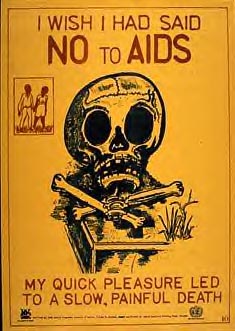




More from
Uganda






More from
Uganda

More from Uganda
3-13-2003
This article appeared in The Washington Times on 3/12/03.
Of course the Washington Times is considered more partisan than the NY Times.
Nevertheless this is a well-researched piece with a wealth of information from workers in the field.
Uganda leads by example on AIDS
By Tom Carter
THE WASHINGTON TIMES
There is new hope that slowing the spread of AIDS in Africa, where an estimated 30 million people are dying from the disease, may be as simple as ABC.
ABC stands for "Abstinence, Be Faithful, or use Condoms," in that order of emphasis. It is also what public health experts call the program begun in Uganda in 1986, when HIV infections and AIDS began washing over Uganda's citizens like a plague. Many Western experts derided the project when it began, but today it is considered the brightest success story in the course of the pandemic.
While condom distribution and so-called "safe sex" have been the core of failed U.S. and international efforts in Africa to inhibit HIV transmission for 20 years, ABC is winning important backers on the left and the right, as "abstinence, be faithful and condoms" campaigns in Senegal and Zambia, modeled on the one in Uganda, have begun to show similar positive results.
A former World Health Organization researcher estimates that if the ABC approach were enthusiastically embraced throughout Africa, HIV infections could be reduced by 80 percent.
President Bush has endorsed the abstinence approach and is asking Congress for $15 billion over the next five years to fight AIDS in Africa and the Caribbean. It has been suggested that without the abstinence component, the $15 billion request would be dead on arrival. With it, and the Uganda data to back it, it has a real chance.
Secretary of State Colin L. Powell has backed the abstinence message in testimony on Capitol Hill, as has Paula Dobriansky, the undersecretary of state for global affairs. And to the chagrin of U.S. AIDS workers in the field, who in the past 20 years have bought and distributed more condoms than anyone on earth, Andrew Natsios, the Bush-appointed head of the U.S. Agency for International Development (USAID), sent out a Christmas Eve cable directing USAID offices around the world that ABC is now official U.S. policy.
Faith-based organizations are enthusiastic about A and B, but for moral reasons, they fear - with little evidence to back it up - that C, condom promotion, may open the door to increased sexual activity among young people. In the public health community that embraces C, there is considerable resistance to emphasis on A and B. Many USAID workers worry that ABC is a cover for an "abstinence-only" policy.
It is not, according to those most familiar with Uganda's success.
"It is not 'abstinence only' or 'condoms only.' Both are needed. There is a need for condoms, if A and B fail. Some people will never change their behavior," said Edward C. Green, a Harvard University anthropologist who is at the forefront of bringing attention to ABC.
He said that specific high-risk groups - like prostitutes and their customers - are unlikely to change and, therefore, need condoms for protection. But what happened in Uganda appears to be proof that the general population can and will change its behavior.
In the end, said Mr. Green, the most significant behavioral change may have come through B, stressing fidelity in marriage or in monogamous relationships.
Ugandan women, afraid for their lives because of philandering husbands and boyfriends, demanded it, and as Ugandan men reduced their number of partners, far fewer infections were transmitted.
The issue is not only ideological. With $15 billion in U.S. aid over the next five years at stake, part of the debate is about how to divide the pie, and those who have been in the field the longest are dismayed that their approach is being discredited.
"The historical approach to HIV has been little A, little B and big C. The public health community at large did not believe in abstinence, but Africans were far ahead of the worldwide public health community on this," said Anne Peterson, a physician and the USAID director of global health who is responsible for overseeing U.S. anti-HIV programs. "Kids are willing and able to abstain from sex. Condoms play a role. They are better than nothing, but the core of Uganda's success story is big A, big B and little C."
Dr. Peterson said the ABC approach is not an ideological balm for religious conservatives or any other group the Bush administration is beholden to. While it may jibe with their conservative moral values, the shift is one driven by evidence of what works.
"I am a public health physician. I take data seriously," Dr. Peterson said.
"Thinking people have to ask the question: 'What works? What saves lives?' " said Elaine Murphy, a global health specialist at George Washington University who has researched the Uganda experience from a feminist perspective.
Ms. Murphy, who calls herself a "knee-jerk liberal," said: "Uganda mobilized as if it were World War III. They did this without donor money, on their own. What happened in Uganda is an exhilarating story."
"It is not what you think will work, but what works," said Norman Hearst, an epidemiologist at the University of California at San Francisco and another self-described liberal sold on ABC.
John Kiwanuka remembers what it was like as a medical student at Makerere University in Kampala, Uganda, in 1986. The nightmare years of dictators Milton Obote and Idi Amin were over. Yoweri Museveni had won the civil war, and Uganda had entered a time of relative peace.
"My friends and I wanted to party and celebrate. We had girlfriends," said Dr. Kiwanuka, a public health physician at the Africa-America Institute in New York responsible for HIV/AIDS policy.
Then the Ugandan president began to speak out.
"There was a dramatic change among students in 1987 and 1988. I took precautions. My friends changed their behavior. The ones that didn't succumbed to the disease," Dr. Kiwanuka said.
Sophia Mukasa Monico, a Ugandan who is the senior AIDS program officer for the Global Health Council in Washington, said that with the ABC campaign, Ugandans, especially women, changed.
"Women had to take responsibility for their own lives. Wives told their husbands to be faithful, use a condom, even in marriage, or there would be no sex. Many women in Uganda had celibate marriages or moved out on their own," said Mrs. Mukasa Monico. She said that today 60 percent of Ugandan women live on their own or provide for themselves.
In 1986, Mr. Museveni sent 60 of his top military officers to Cuba for training. Almost one-third tested positive for HIV. At a conference in Zimbabwe later that year, Cuban President Fidel Castro took Mr. Museveni aside and told him, "Brother, you've got a problem," according to a story Mr. Museveni has told publicly.
Mr. Museveni took the warning seriously. Uganda was considered a pariah nation at the time. So with almost no outside money or expertise from Western public health experts, Mr. Museveni embarked on an urgent public anti-AIDS campaign, now called ABC.
He told young people to wait, that they had their entire lives ahead of them to have sex. Abstain until marriage. Delay the onset of sexual activity. Early sex was not worth dying for.
For those already married or sexually active, he told them to be faithful to one partner. In Uganda, it was called "zero grazing" - no sex outside of a monogamous relationship. The epidemiological data suggests this may have been the most important ingredient for success.
For those who either would not or could not be abstain or be faithful - high-risk groups such as commercial sex workers, soldiers, men who have sex with prostitutes and long-haul truck drivers, the president exhorted them to at least use condoms.
Mr. Museveni, the "Big Man" in African tribal terms, told his people it was a matter of life and death. The campaign was politically incorrect. There was a lot of straightforward fear-mongering: "Have sex and die." Billboards with coffins, skulls and crossbones promoting ABC were put up across the country. Radio, television and newspapers were used to promote the campaign.
Anglican, Roman Catholic and Muslim religious leaders, and their networks of clinics and schools, were drafted to promote abstinence and being faithful. As the most influential organizations in the country, churches and mosques were asked not to oppose the condom component.
Pop-music celebrities, sports stars and prominent priests spoke openly about their infections or deaths in their families. The president involved all aspects of his government.
His top advisers and his wife were drafted to speak frankly about sex and its consequences. This was particularly important in a religious country where it was unheard of to discuss sex openly or in mixed company.
And the Western AIDS specialists, all experts on AIDS in specific populations - men who had sex with men, or drug users and their partners - smirked. Based on the premise that homosexual men and drug users cannot change their behavior, the experts said, Ugandans won't change their behavior either. Africans are promiscuous: Let them have safe sex, use condoms.
"The AIDS establishment laughed at him. ... But Museveni was right," said Dr. Hearst, who has just finished a report to UNAIDS on condom efficacy. "I've had people tell me that the only reason they were successful in Uganda is that there were no European or American experts there."
And while USAID distributed condoms by the billions and the numbers of HIV infections in the rest of Africa skyrocketed, the number of Ugandans becoming infected declined each year.
AIDS prevalence among pregnant women - the universal yardstick for determining the transmission rate of AIDS in a population - was 21 percent in 1991. By 2001, it had dropped to 6 percent.
In 1994, more than 60 percent of Ugandan boys ages 13-16 reported being sexually active, a number that dropped to about 15 percent in 1996 and 5 percent in 2001. Among girls, the shift was equally dramatic.
Most significantly, the number of men reporting two or more partners in a year dropped from more than 70 percent in 1989 to between 15 percent and 20 percent in 1995. The number of women reporting multiple partners dropped from 18 percent in 1989 to 2.5 percent by 2002.
Meanwhile, the use of condoms in high-risk groups rose to the highest level in Africa.
"Young people were [losing their virginity] at a later age. Ugandans were having fewer partners. Significantly fewer people were getting other [sexually transmitted diseases]," a key risk factor for contracting HIV, said Mr. Green, the Harvard anthropologist and one of the primary authors of a monograph on the USAID Web site called "What Happened in Uganda?"
"Significantly fewer people were getting AIDS," Mr. Green said. "No other country in the world has had that kind of decline."
But an idea long promoted by religious groups in Europe and the United States was an anathema to liberals on the front lines of the disease.
It would have been easier to promote this idea if former Vice President Al Gore, rather than Mr. Bush, had been elected, said Mr. Green, because no one on the left would be suspicious that ABC was a Trojan horse for the abstinence-only groups on the right.
"The right opposed condoms on moral grounds. On the left, those who oppose ABC are just as religious in their beliefs as missionaries, and no more constructive. They are willing to let Africans die rather than embrace something that goes against their way of life," Dr. Hearst said.
At a recent conference on AIDS and Africa organized by the Washington-based private, nonprofit Center for Strategic and International Studies (CSIS), Geeta Rao Gupta, internationally known for her work in the fight against AIDS, drew sustained applause at the end of an emotional speech with the statement: "Condoms do not work 100 percent, but neither does abstinence."
While USAID's Dr. Peterson, a former medical missionary to Africa, and Mr. Natsios, have made ABC a priority, there is resistance in the ranks of USAID.
"The people in the global heath bureau hate it, and fear for their jobs. They hope if they keep quiet, ABC will pass and they can get back to what they were doing," said one USAID insider on the condition of anonymity.
Dr. Peterson says there has been reluctance to accept ABC by "liberals" in her bureau, but said they are being won over by the hard science.
"We have been convening ABC experts' meetings. USAID is going toward a balance of A, B and C. My staff in Washington is pretty comfortable [with the new direction]. The data is beginning to change their views," she said.
Academics and researchers who embrace the ABC approach find themselves shunned by former colleagues in the public health community. Mr. Green said he has become something of a pariah, and he carefully weighs every word, least he detract from the message: namely, that ABC works.
"There really is not any clear evidence that condom promotion by itself has been able to roll back the AIDS epidemic in any country where there is widespread transmission," Dr. Hearst said. "In Africa, people cannot get clean water and aspirin. How are they going to get condoms consistently? ... It may be that the healthiest thing to do is scare people to death."
In a part of South Africa where 35 percent to 40 percent of the population is infected with HIV, Dr. Alan Whiteside, a professor at Natal University who has been working on the AIDS pandemic for 20 years, said the Uganda program can be and should be duplicated.
"I think you have to be politically incorrect and change behavior. Young people need to scare their peers about this," Dr. Whiteside said at the recent CSIS conference on AIDS. "There is a lot of room in this for scare tactics."
And slowly, USAID contractors, such as Population Services International, responsible for programs in Africa, are coming around. Before, PSI measured success almost entirely by how many condoms it distributed in a particular country. But like Ugandans, public health specialists can change their behavior.
"We promote abstinence and delayed onset of sex among youth, partner reduction and condom use among the sexually active, voluntary counseling and testing, and the reduction of transmission of the virus from a mother to her newborn. If we are to win this fight against AIDS, we must use every tool at our disposal," said David Olson, Population Services International spokesman.
The emphases are mine -- I've underlined three crucial points:
1. The intensely homophobic assumption made by the safer-sex boyz that gay men are innately promiscuous and are like IV drug users -- incapable of behavior change.
That's homophobic bullshit.
2. That negatives work.
You can tell people the truth so long as it's the truth.
That's why we keep saying anal is dirty, dangerous, and degrading.
It's true, every "man into anal" knows it's true, and our repetition of that truth is punching through the community's denial.
3. That, as Dr. Green says, the most significant behavioral change may have come through "B," stressing fidelity in marriage or in monogamous relationships.
That's exactly what we've been doing on our Fidelity Alliance page, in The Man2Man Alliance, and in our policy paper Why Be Faithful, and we'll continue to do so.
Because safe promiscuity is an oxymoron.
And because psychologically and spiritually,
Fidelity is the better way to go.
For far too long the gay male subculture has been defined by anal, promiscuity, and kink.
That's been a disaster for health, for morality, for happiness.
It's created a community riddled with disease, in which bug-chasers pursue gift-givers and men hop from one partner to the next, at once deserted and deserting.
We know a better way, our warrior way, a way that's martial, masculine, and monogamous, a way which embraces Phallus and Fidelity.
Related articles:
If they can do it in Uganda, why can't we do it here?
Do Gay Men Have To Be Promiscuous?
About Promiscuity, Str8 guys, Boytoys, and Men Who Love Men.
Fighting the Conformity That Kills.




AND


Warriors Speak is presented by The Man2Man Alliance, an organization of men into Frot
To learn more about Frot, ck out What's Hot About Frot
Or visit our FAQs page.


© All material on this site Copyright 2001 - 2010 by Bill Weintraub. All rights reserved.


